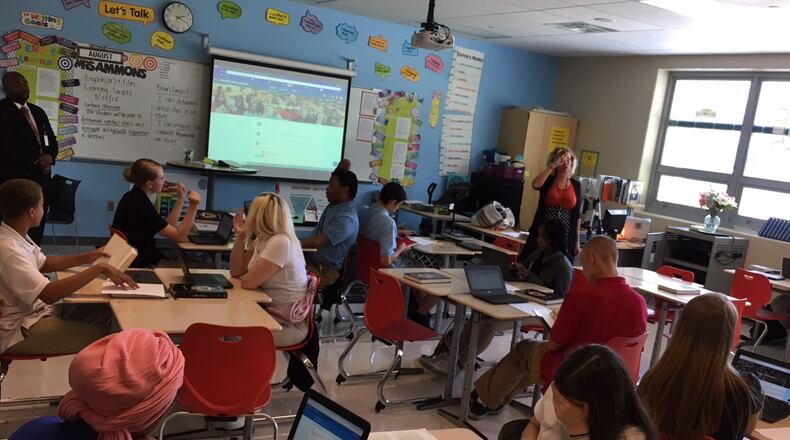RELATED: Teachers key to success. What Dayton schools are doing to improve them
On the wall of Denham’s classroom was listed the specific state standard she was teaching the day a Dayton Daily News reporter sat in her classroom: “Add and subtract like and unlike fractions using integer rules.”
The kids wore matching blue shirts and brown slacks. But their faces held the spectrum of expressions. Some were engaged. Others bored or confused. Some joked. Others focused. Denham and Vieson worked to help each one along.
At one point, Denham spied a student sitting idle. She pulled a chair up next to him.
“Here’s what I’m going to do,” she told him. “I’m going to sit here until you start working.” He put pencil to paper.
The Path Forward: The region must rally to fix the Dayton Public Schools
EJ Brown Principal Channey Brown says Denham and Vieson are “two of our rock stars.”
He and education experts say you know a good teacher when you see one. But as DPS tries to improve the quality of teaching, educational experts say measuring teacher quality is tricky. It’s hard to pin down what makes someone a good teacher.
“You can point out some teachers who year after year produce strong test score gains in their students, but it has been very hard to pin down exactly what they are doing that leads to their test score gains,” said Laura Hamilton, a behavioral scientist and education expert at the RAND Corporation.
Path Forward podcast: Let’s hear from the kids - The Path Forward: Dayton Schools podcast
But there are so many other factors that go into teacher quality — subject matter mastery, relationship building, classroom management, etc. — officials haven’t figured out how to quantify what makes someone a good teacher.
The state of Ohio has attempted to create ways to measure teacher quality to questionable results. A Dayton Daily News analysis last year found that 44 percent of school districts placed every one of their teachers in the top half of the state’s rating system. Locally, Dayton was one of only three districts to rate any teacher as ineffective.
In the 2017-2018 school year, Dayton rated 1.1 percent of its teachers as “ineffective,” which was the third highest in the state. Only 33 of the 608 districts in the state rated any of their teachers as ineffective, putting the teacher on an improvement plan that could lead to their dismissal if performance doesn’t improve.
RELATED: What a state takeover would mean for Dayton schools
One area superintendent called the system “somewhat meaningless.”
The state is currently revising its teacher rating system and will start pilot-testing a new version next year.
DPS teachers union president David Romick believes Dayton has good teachers and that the current professional development will help as long as district leaders stick with these methods — consistency hasn’t been their strong suit in the past, he said.
“(Teacher quality) is sort of an ethereal sort of thing that nobody has been successful in really measuring, even our teacher evaluation system doesn’t measure it very well,” he said.
Denham has only been teaching for three years. She came to DPS from Hamilton schools.
“There I felt more I was a teacher and that was strictly it. Here I feel I’m more than just a teacher. There are students that come in and the first thing they do is give me a hug because that’s what they need,” she said. “So you kind of just have to know what your students need each day and teach to that.”
JOIN THE CONVERSATION: The Path Forward: Dayton Schools Facebook group
About the Author

